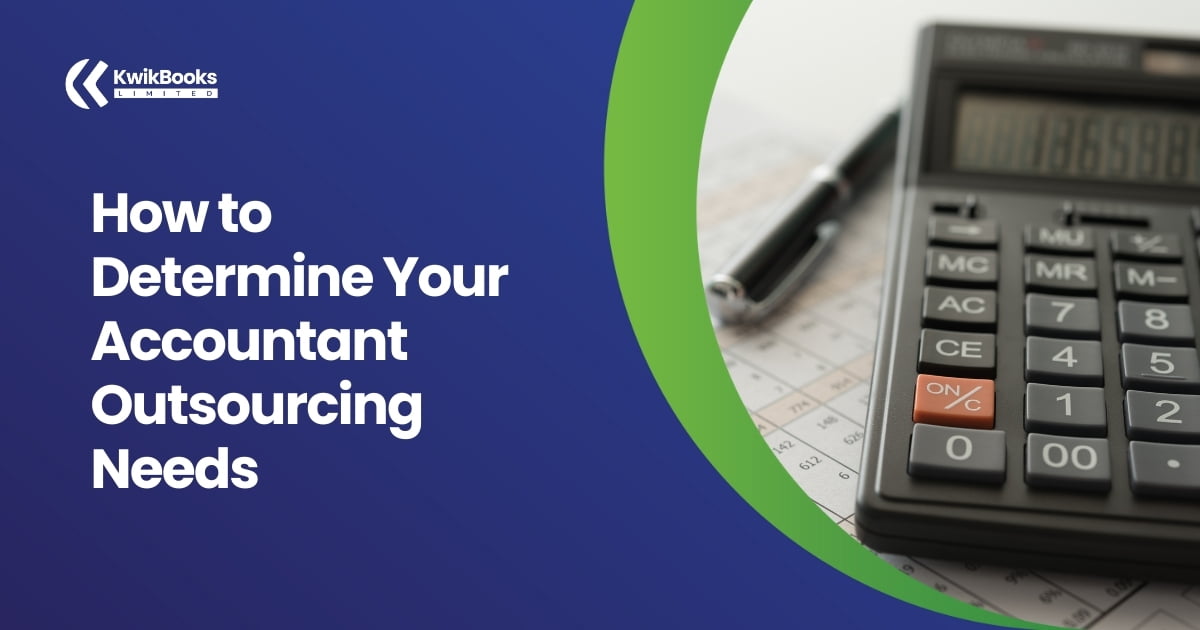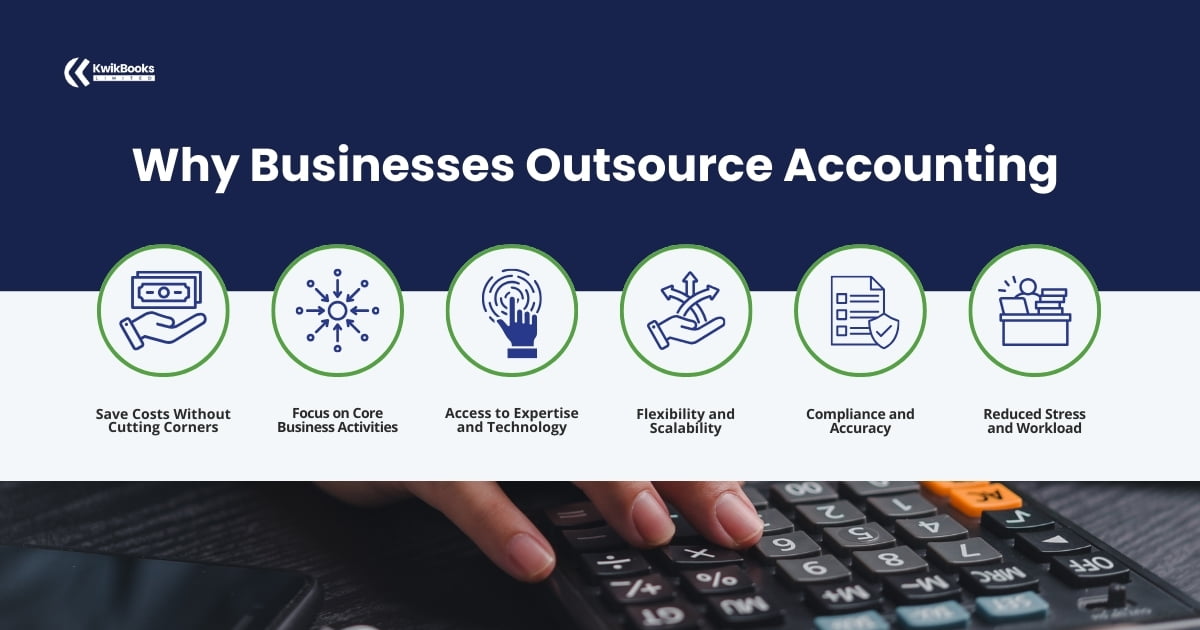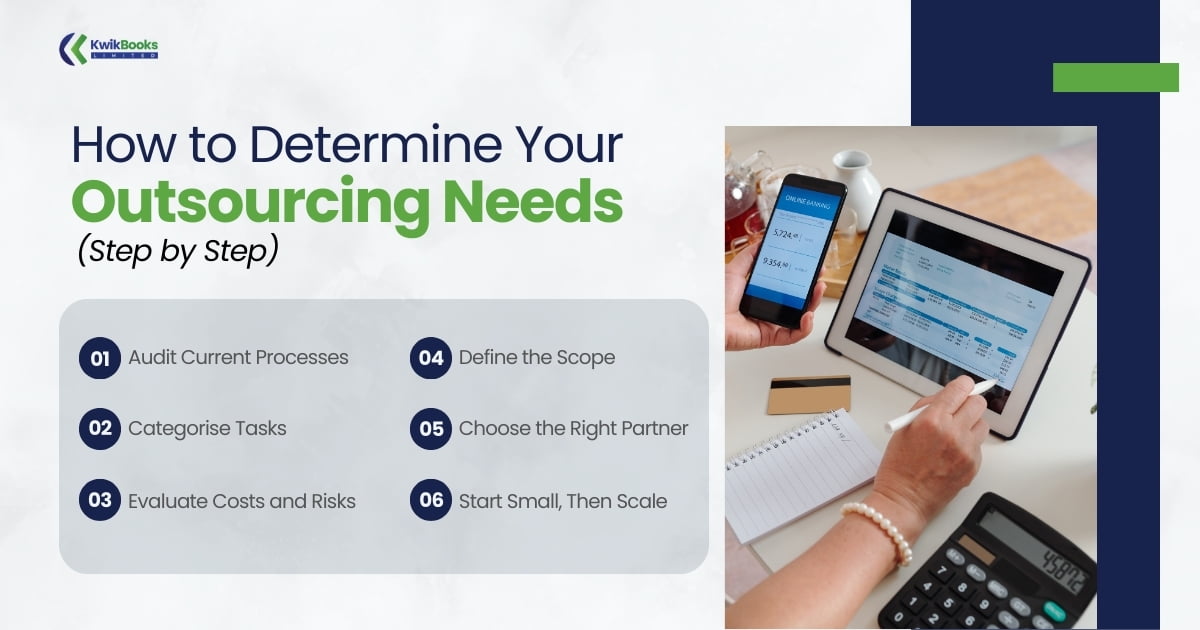
In today’s fast-paced business environment, UK companies are under constant pressure to cut costs, stay compliant, and focus on growth. One solution that has gained momentum is accounting outsourcing. For many business owners and accountants, the idea of handing over financial processes to a trusted partner is no longer an option, it’s a necessity for efficiency and peace of mind.
This guide will walk you through what accounting outsourcing is, why it matters, and how to determine your business’s specific outsourcing needs, with KwikBooks as your partner in achieving financial clarity.
At its core, accounting outsourcing means delegating some or all of your financial tasks to an external provider who specialises in these services. Instead of hiring full-time staff, you gain access to skilled professionals and modern tools without the associated overheads.
Businesses typically outsource accounting services such as:
In short, outsourcing allows you to focus on strategy, while specialists handle the routine but critical financial work. That’s the essence of what is accounting outsourcing.

The decision to outsource accounting isn’t just about saving money, it’s about unlocking long-term value. Here are some key reasons why organisations make the switch:
Maintaining an in-house accounting team means salaries, training, pensions, and office costs. With outsourced accounting services, you only pay for what you need.
When financial admin consumes too much time, it distracts from growth, customer service, and innovation. Outsourcing frees your team to concentrate on what matters most.
Specialist providers like KwikBooks are equipped with the latest accounting systems, offering seamless efficiency without you having to invest in new software.
Outsourcing gives you the ability to scale services up during year-end crunches or seasonal peaks, then scale down during quieter months.
The UK financial landscape is tightly regulated. An outsourced team ensures your records remain accurate and compliant with HMRC rules, minimising costly errors.
Outsourcing isn’t just about business efficiency, it’s also about creating balance for business owners and staff, preventing burnout and turnover.
This is why so many organisations now see why outsource accounting as a smart, long-term decision.
Not every business needs to outsource everything, but there are clear indicators that it may be time to explore your options:
If several of these apply, it’s time to assess how does accounting outsourcing work for your business.

Here’s a practical roadmap to evaluate whether outsourcing fits your situation:
Make a list of tasks your internal team handles, how much time they take, how complex they are, and where errors occur.
Break tasks into two categories:
The first group is usually ideal to outsource.
Compare the total cost of in-house operations (salaries, training, software) against the cost of outsourcing. Factor in the risks of errors, non-compliance, and inefficiency.
Decide whether you need to outsource accounting services fully or partially, such as only bookkeeping, payroll, or VAT submissions.
Look for an experienced provider with UK expertise, proven systems, and strong data security standards. A provider like KwikBooks offers a tailored approach to match your unique business requirements.
Trial outsourcing with a specific area (like payroll) to evaluate benefits. Once you’re confident, you can expand to more comprehensive services.
This step-by-step process ensures you adopt outsourcing in a structured, low-risk way.
Although outsourcing has become a common practice for UK businesses, a few myths still prevent decision-makers from taking the step. Here’s a deeper look at the most common misconceptions:
Many business owners fear that outsourcing means handing over full authority to a third party. In reality, outsourcing is about collaboration, not replacement. You retain complete visibility of your financial data, receive regular reports, and approve all major financial decisions. A good outsourcing partner acts as an extension of your team, ensuring transparency through cloud-based systems and clear communication channels. Far from losing control, you actually gain better insights and clarity.
Data privacy and security are top concerns, especially with sensitive financial information. Reputable providers like KwikBooks operate under strict compliance frameworks such as GDPR, ISO 27001-certified practices, and encrypted file-sharing systems. Access to your data is restricted, monitored, and regularly audited. In many cases, your financial records may be more secure with an outsourced provider than with in-house storage, which can be vulnerable to staff turnover, accidental breaches, or outdated systems.
Another misconception is that outsourcing will cost more than keeping an in-house accountant. The truth is quite the opposite. With outsourced accounting services, you eliminate hidden costs like recruitment, salaries, pensions, training, and software licences. Instead, you pay only for the services you need. Outsourcing converts fixed costs into variable ones, allowing businesses to scale up or down without long-term commitments, making it a far more cost-effective model.
Smaller companies sometimes believe outsourcing is reserved for large corporations. In fact, small and medium-sized enterprises (SMEs) stand to benefit the most. With limited budgets and teams, outsourcing provides SMEs with the same level of expertise and technology that bigger players enjoy without the hefty overheads.
Thanks to cloud-based platforms, secure portals, and dedicated client managers, outsourcing partners maintain open lines of communication. You can access records in real time, schedule regular check-ins, and receive instant updates just as you would with an in-house accountant.
Quality is another area where outsourcing is often underestimated. Specialist outsourcing firms employ professionals trained to UK accounting standards, with expertise across multiple industries. Because their reputation depends on accuracy and compliance, outsourced teams often deliver higher consistency and fewer errors than overworked internal staff.
At KwikBooks, we understand that outsourcing is not a one-size-fits-all solution. That’s why we offer:
If you’re considering outsourcing but don’t know where to begin, start with a simple checklist:
From there, book a consultation with KwikBooks to explore a customised solution.
Determining your accountant outsourcing needs comes down to one thing: clarity. By identifying where your business struggles and aligning with a trusted partner, you can save money, reduce stress, and focus on growth.
KwikBooks is here to help UK businesses streamline their accounting and bookkeeping through outsourced accounting services designed to be flexible, compliant, and cost-effective.

Stay updated with expert bookkeeping tips and insights! Subscribe now to receive updates directly in your inbox for your business.
* We never spam your email
KwikBooks Limited 1 Hadley Court, 223 Ballards Lane, London, N3 1NB,
Monday - Friday 09:30 AM - 05:30 PM
© 2026 All Rights Reserved.